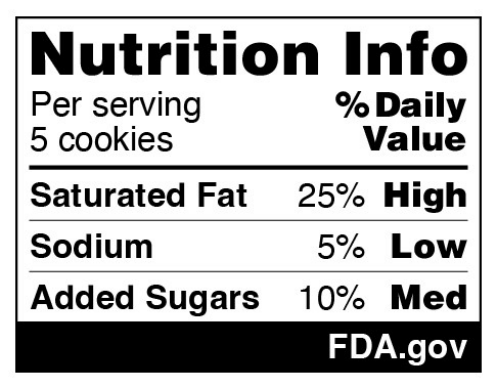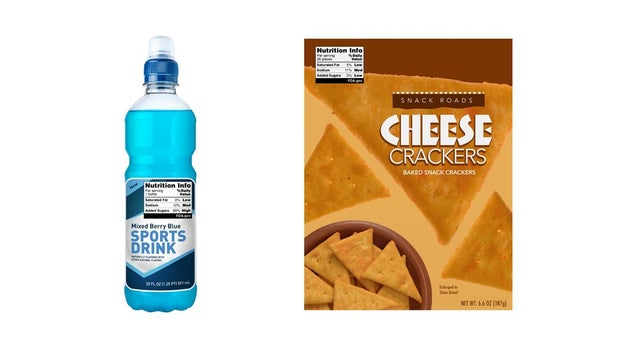
The Food and Drug Administration released on Tuesday its long-awaited proposal to require food manufacturers to put some nutrition facts on the front of packages, in a bid to nudge Americans and food companies towards healthier diets in line with similar pushes in other countries.
FDA’s new “nutrition info box” focuses on telling people whether levels of saturated fat, sodium and added sugar are “high” or “medium” or “low” as well as the percentage for each serving.
Food and Drug Administration
The proposal will be open for public comment for 120 days. It will be up to the incoming Trump administration to decide if and how to finalize the rule.
After that, the FDA says that large food companies earning more than $10 million annually will have three years to comply with the rule. Smaller food brands will have an additional year.
Up to $154 million will be spent by the food industry over the next decade to relabel their products with the new box, the FDA estimates.
The agency also estimates many food brands may also spend millions more dollars to try to rework their products, changing their recipes to avoid being called out as having too much of an unhealthy nutrient.
“We assume there may be manufacturers who would want to reformulate to maybe move from the high category into the medium category, or the medium category into the low category,” Rebecca Buckner, the associate deputy director for human food policy at the FDA, told reporters on Tuesday.
Food and Drug Administration
Robert F. Kennedy Jr., President-elect Trump’s pick to head the federal department that oversees the FDA, has been sharply critical of federal nutrition officials for not doing enough to help Americans eat healthier diets and crack down on the food industry.
Kennedy has not specifically addressed the proposal. A spokesperson for Kennedy did not respond to a request for comment.
Why only saturated fat, sodium and added sugars?
The FDA said it will require the box to only call out saturated fat, sodium and added sugars. Food manufacturers would not be able to put other nutrients inside the FDA’s information box.
They cited research showing that “simpler schemes are easier for consumers to understand” for narrowing the box down to just these three worrying unhealthy nutrients.
Designs they tested with focus groups that included nutrients Americans need more of, like fiber and calcium, confused participants.
The FDA said it is still weighing whether calories should be incorporated into the label and acknowledged that some food brands are already voluntarily listing the information on the front.
What determines “high,” “medium” and “low” levels?
FDA officials said Tuesday that levels of saturated fat, sodium or added sugars will be deemed as “high” if they are above 20% in the daily value, a measurement of how much Americans eat each day in the “reference” diet. Medium was set at between 6% and 19% of the daily value. And low is 5% and below.
Agency officials have used these benchmarks for “high” and “low” for decades, dating back to the formulation of the nutrition facts label back in the 1990s.
At the time, officials decided against including the “interpretive descriptions” in the nutrition facts label. But the agency said recent data shows many Americans do not understand the percentages.
“It’s really based on longstanding usage,” McKinnon said.
What will it look like?
The FDA says food makers will be required to put the labels “somewhere in the top third” of the front of the box.
The box also uses the same Helvetica font used in the nutrition facts on the back of the package and must comply with a range of more detailed rules to avoid it from being too small or obscured by other designs on the package.
Some other design decisions were also abandoned during the focus group testing process, the FDA said.
For example, previous mockups using the colors red, yellow and green to call out different levels did not make a statistically significant difference in helping people interpret the box.
Editor’s note: A previous version of this article misstated the number of days the public comment period is open. It is 120 days.







